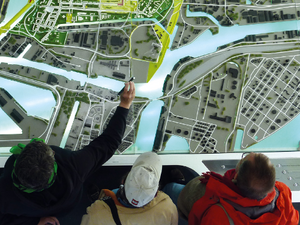Digital data at the service of security
Security being an important dimension of the attractiveness and quality of life of the Paris Region, local stakeholders are mobilised to face security-related challenges. To optimise their action in this area, they produce and use databases on acts of delinquency and disturbances of public peace in their respective local areas.
In the era of Smart Cities, the management of local security remains subject to digital tools. Alongside the ruling departments of the state, local players are also involved in this issue. Local government authorities, social housing landlords and transport operators are setting up databases to better identify difficulties and map out the course of action, convinced that the new technologies mechanically enhance performance levels.
Local players and producers of data
To collect and process data, local players may develop their own system internally or call on specialist service providers. There is a market for companies that design and market dedicated software. However, a closer look at actual practices reveals enormous disparities of provision. Databases are as diverse as the local realities, the methods of collection and the players who use them. The facts recorded are enormously varied depending on the fields of intervention. Some are classified under the categories used by the state police departments. The declared intention is to adopt “a common language” with the law enforcement authorities, as specified to us by the Security Manager of a public housing authority. The databases also record minor acts of delinquency/disorder that are below the threshold of criminal offences, known to locals as “incivilities.” Most of these acts are disturbances of the peace: setting garbage cans on fire, wrecking vehicles, noise disturbance, uncleanliness, occupation by vagrants of building entrances, verbal threats and disputes, etc. The tools used are also very diverse. The databases are also fed data from the population provided in a collaborative way, which promotes participatory democracy. However, most of the data is provided only by professionals. In general, these are community offices (urban mediators, municipal police officers, building security staff and caretakers, bus drivers and ticket collectors, etc.), who are in regular contact with the public and who must report this information. To do this, they follow a variety of protocols and use tools of a greater or lesser sophistication. Some fill in forms by hand, others use computerised platforms, which enable statistical processing and mapping. Data characteristics depend on the procedures for data recording and management. Other factors are the way technology is deployed in the field, and the willingness or otherwise of those involved to provide information with sufficient detail. Such data have their limitations and certainly do not provide a perfectly objective and transparent measure of levels of insecurity. First and foremost, they reflect the activity and views of field professionals.
Databases are as diverse as the local realities, the methods of collection and the players who use them.
Steering-decision support tools and communication
Various tools are available as instruments of diagnostics and assistance in decision-making. Local players use them internally for steering projects, team management and allocation of appropriate resources to closely meet identified needs. For example, the Paris joint landlord building surveillance group (GPIS) oversees the night-time security of 500 social housing complexes. To optimise deployment of staff to all locations, the GPIS relies on a digital system quantifying occupancy of common areas and providing daily updates of residences by five levels of criticality1, which in turn determine how frequently they are visited, from a weekly round, to reinforced daily inspections. Another example is the use of digital data streams by local players to position themselves and communicate with the population and their partners. At Mantes-la-Jolie, for example, the municipality has acquired a data processing software program which provides a mapping service updated daily by urban mediators, and more occasionally by social housing landlords, transport operators, the local and national police. Thanks to this tool, all players can feed information back, share it and engage in interventions according to their prerogatives. This is a practical way of keeping the partnership alive. How widely such systems are adopted nevertheless depends on their benefits to those using them, and on whether data collection leads to effective action on the ground. This raises the question of the ability to operate, prioritise and process the information compiled, the challenge being to provide solutions to the problems reported. Another question arises from the fact that digital tools impact the performance of their duties by local service providers, insofar as they generate a great deal of reporting work and follow-up analysis. But do they affect the way services themselves are delivered on the ground? In any case, the question must be raised as to whether the spread of IT tools ultimately favours managerial logic for dealing with spatial issues and responding to problematical situations. Such a logic is essential but should certainly not be the only line of action for local security policies, at the risk of neglecting prior risk prevention.
Announced development of predictive modelling
In the local security field, digital data have opened up new prospects, not only for the diagnosis of existing situations, but also in anticipation of new risks. Using sometimes opaque algorithms, predictive policing claims to be able to predict the times and places of future breaches of the law, particularly in the United States. True, predictive software programs have not yet been developed in France, but the National Gendarmerie is working on projects of this type. It is likely that they will be progressively disseminated, which may raise some ethical and practical issues.
Camille Gosselin, urban planner, Virginie Malochet, sociologist and Émilien Pellon, L'Institut Paris Region
1. Prioritised by degree of importance.
Further reading
Bilel Benbouzid “Who benefits from the crime? the crime prediction market in the united states”, la vie des idées, 13 September 2016
Bilel Benbouzid “From situational prevention to predictive policing”, Penal Field, VOL. XII,9 June 2015
This page is linked to the following category :
Economy
